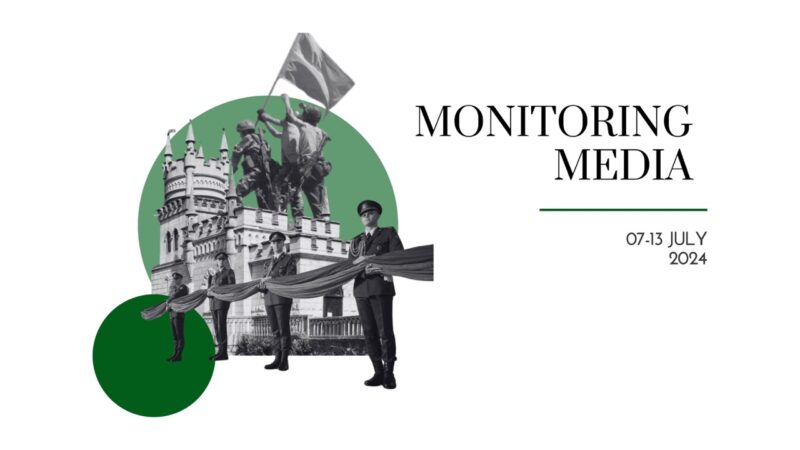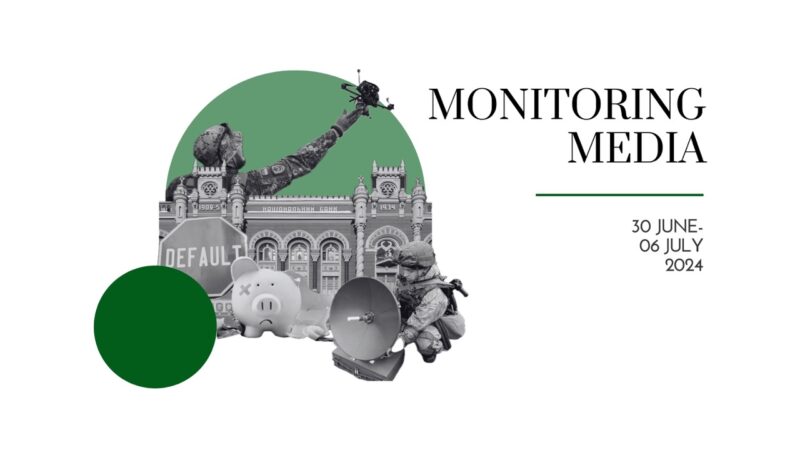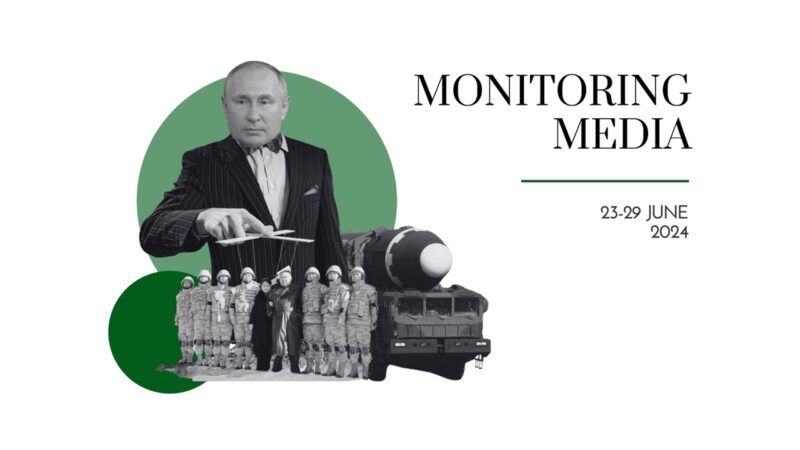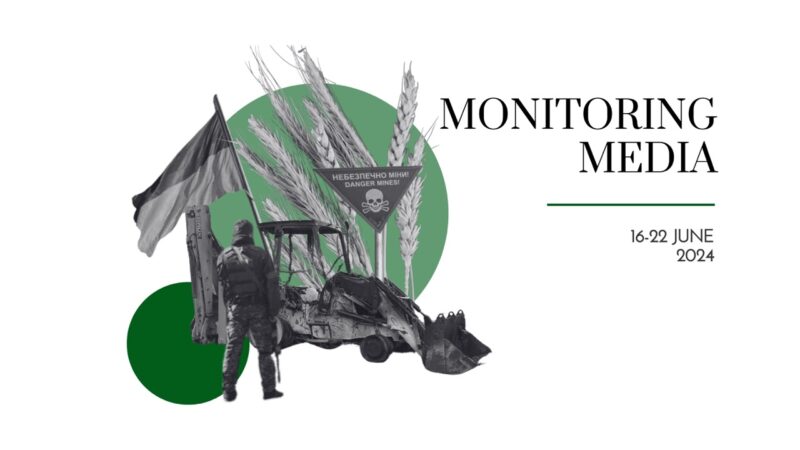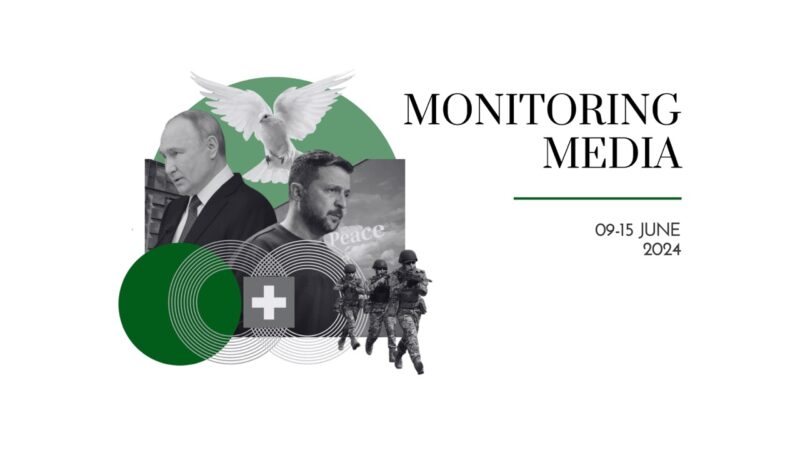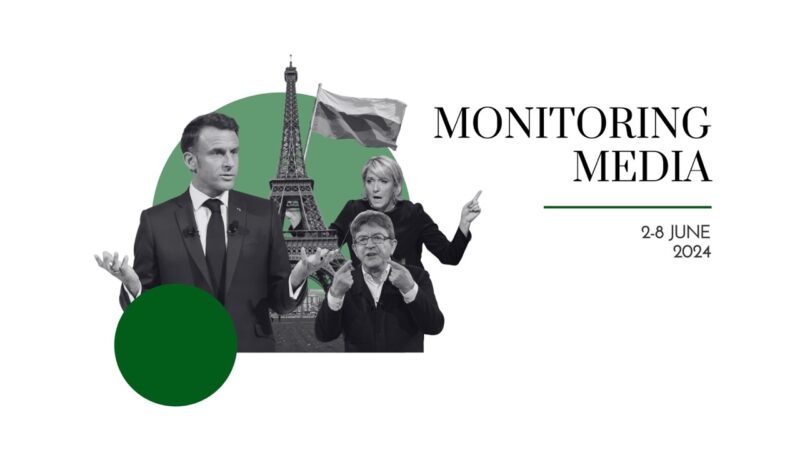Wrong questions about the Russo-Ukrainian war
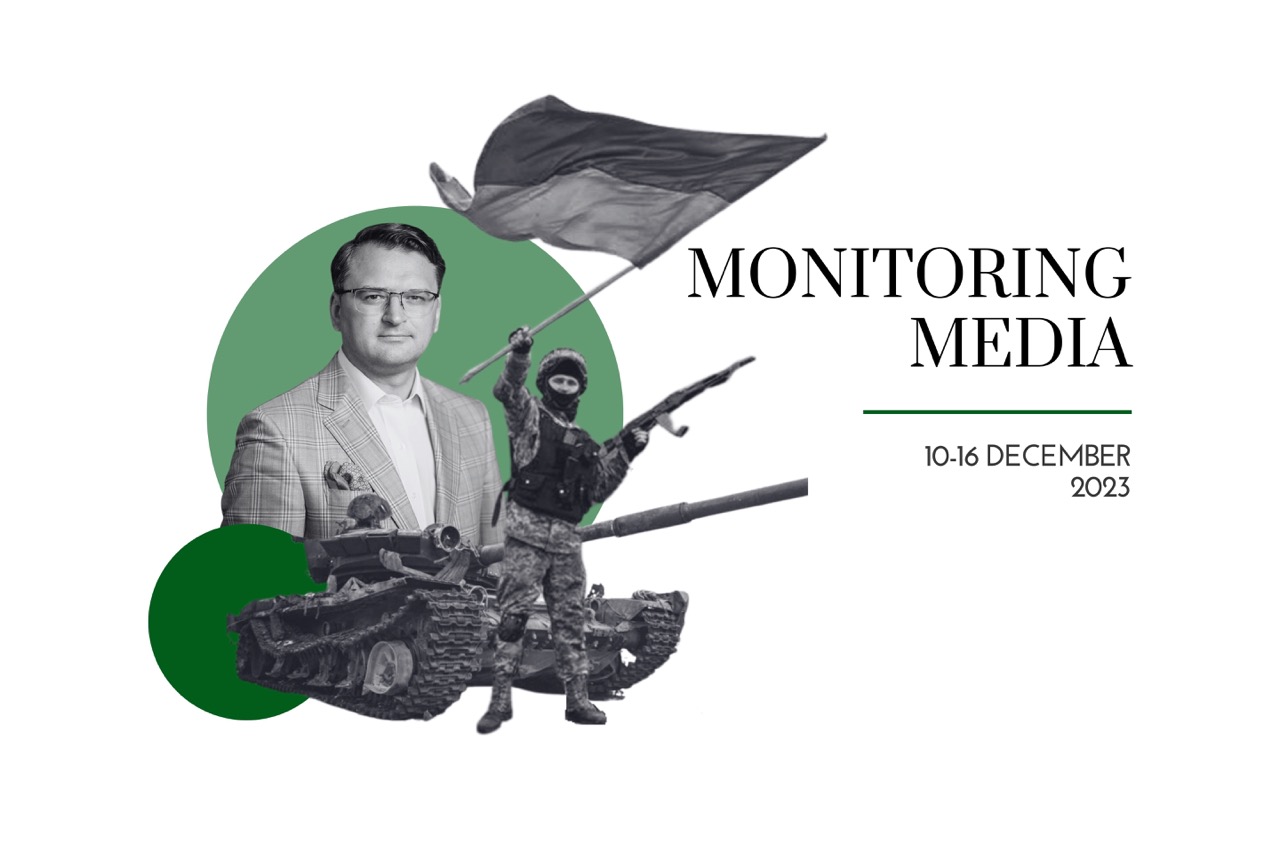
CIUS weekly report on North American media coverage of Ukrainian affairs, 10–16 December 2023
Six publications (Foreign Policy, The National Interest, Foreign Affairs, The Atlantic, Ottawa Citizen, The Washington Post) were selected to prepare this report on how Ukraine has been portrayed in the North American press during the past week. The sample was compiled based on their impact on public opinion as well as on their professional reputation, popularity among the readership, and topical relevance. These publications represent centrist viewpoints on the political spectrum.
This report covers only the most-read and relevant articles about Ukraine, as ranked by the respective North American publications themselves in the past week. Its scope covers promoted articles on home pages and articles from special sections on Ukraine, with the hashtag #Ukraine, from the paper editions of the publications, and about Ukraine from opinion columns and editorials.
Topics featured in the selected articles:
- The world and Ukraine: сonsolidation of the democratic core countries can save the rules-based world order; Ukraine’s path to victory; wrong questions about the Russo-Ukrainian war;
- Russia at war: opportunities for Ukraine emerge from Moscow’s economic paradoxes.
Main arguments:
Moscow’s economic paradoxes open up opportunities for Ukraine. Natalia Antonova (Foreign Policy) describes the gap between the relative technocratic efficiency of the Central Bank of the Russian Federation and the demands of the Kremlin’s war machine. She suggests that this gap should be used by Ukraine and its allies to help achieve victory. Russians’ fear of poverty is a key driving force behind domestic political change. Devaluation of the ruble or even a potential default is a matter of extreme concern for Russian citizens, especially for those who remember the turbulent 1990s. For now, the Kremlin and the Central Bank—the latter headed by Elvira Nabiullina—are allies. The Bank of Russia is doing everything it can to save the national economy, even though it had the opportunity to “sabotage the Russian war machine.” Nabiullina’s strategy “has included bold rate hikes and constant communication with the Russian public, as she knows the cost of panic.” However, according to Antonova, “the struggle to keep the ruble afloat is one that the Central Bank will likely lose, but not fast enough.” Exploiting these differences and further tightening the screws on the economy could lead to growing cracks in the relationship between the Kremlin and the Central Bank: “The Central Bank wants the Russian economy to be more transparent and to function normally, while the Kremlin is in a protracted fascist spiral that threatens these goals.”
Consolidate the democratic core to save the rules-based international order. Michael Miklaucic and John R. Allen (National Interest) suggest that a well-planned strategy to counter authoritarian ambitions is needed in order to preserve and strengthen the rules-based (aka “liberal”) international order. Autocratic regimes seek to replace it with a global order that is “conducive to authoritarian governance based on pervasive surveillance, social and political control, and rigid regime leadership.” Today’s revanchists, Russia’s Vladimir Putin and China’s Xi Jinping, have “directed their respective elements of national power toward a reordering of this liberal, rules-based paradigm.” The goal of their efforts is to defeat and replace the “liberal rules-based global order, which both China and Russia view as a euphemism for containment and a rubric for sustaining Western global hegemony.” According to the authors, the best counterbalance to the assertive revisionism of Russia and China is “core consolidation.” In their view, the core is not a geographical entity or an alliance against Russia or China, but a coalition of states that are “committed to the liberal, rules-based global order embracing human liberty, social justice, and the norms of international behavior articulated in the UN Charter and the Universal Declaration of Human Rights.” Between these two poles are “hedging states” that drift in their sympathies. To prevail in the competition for the contested spaces, “the core must offer a better deal, a better pathway to security, justice, and prosperity.” According to Miklaucic and Allen, in order to win this fight, it is very important to support coalition allies: “The core countries cannot neglect the challenges forced upon them today by their authoritarian adversaries—they cannot abandon Ukraine or Taiwan. Yet the reflexive focus on our adversaries diverts us from the other, equally important element of the equation—our allies, partners, and the undecided.”
There is a path to Ukraine’s victory. In Foreign Affairs, Ukraine’s Minister of Foreign Affairs Dmytro Kuleba argues that pessimism regarding Ukraine’s victory in the war is unfounded, and it would be a mistake to let defeatism shape policy decisions going forward. On the contrary, policymakers in allied countries should keep the bigger picture in mind and not lose their way, as Ukraine’s victory will require strategic restraint and foresight. According to Kuleba, any outcome other than Russia’s defeat in Ukraine will have catastrophic consequences—not only for Ukraine but for the entire world: “It would cause a global disarray that would ultimately threaten the United States and its allies, as well.” Wars of this magnitude have their stages, with successful and not-so-successful periods. The key is the final result. In Ukraine, that means “both fully restoring our territorial integrity and bringing those responsible for international crimes to justice—goals that are both clear and feasible.” Only such an outcome can guarantee peace and security for Ukraine. Some skeptics argue that these goals are unattainable, but this is not the case. They are possible upon the fulfillment of three factors: (1) sufficient military assistance; (2) “rapid development of industrial capacity in the United States and Europe as well as in Ukraine, both to cover Ukraine’s military needs and to replenish U.S. and European defense stocks”; and (3) a principled and realistic approach to negotiations with Russia. Meanwhile, another group of skeptics believes that freezing the military conflict is a realistic solution at the moment. However, it must be understood that such a step would reward Russia for its aggression against a sovereign state and allow it to prepare a new massive offensive. Other critics focus on the price that the US and other allies are paying for supporting Ukraine—but it is worth remembering that “this support is not, and never has been, charity. Every dollar invested in Ukraine’s defense returns clear security dividends for its supporters.” And last but not least, the skeptics fail to take into account the desire of Ukrainians to fight for their country: “Eighty percent of Ukrainians oppose making territorial concessions to Russia, according to a recent survey conducted by the Kyiv International Institute of Sociology.” Kuleba declares, “Opting to accept Putin’s territorial demands and reward his aggression would be an admission of failure, which would be costly for Ukraine, for the United States and its allies, and for the entire global security architecture. Staying the course is a difficult task. But we know how to win, and we will.”
Wrong questions about the Russo-Ukrainian war. Tom Nichols (Atlantic) argues that it is a mistake to demand that either Kyiv or President Biden’s administration provide scenarios for ending the war. The bitter lessons of US history have convinced generations of American strategists that the planning in every war, regardless of how it begins, “should include an ‘exit strategy.’” According to Nichols, exit strategies are something that is based on American hubris: “Only very powerful countries, captured by the delusion that planning and firepower grant near-complete control of events, can afford to think about how to ‘exit’ a war before it’s even been won.” In the context of a full-scale war, as in Ukraine, demand for formulating exit strategies is meaningless. Therefore, the demands of many critics of aid to Ukraine to formulate such strategies are meaningless. Moreover, there are other contradictory theses of the opponents of aid to Ukraine: they argue that “aid to Ukraine needs more ‘oversight.’” According to the author, this statement is also irrelevant: “The United States…has placed limits on how American weapons can be used, but the Ukrainians are not going to be able to account for every shell and missile. Even the hyper-bureaucratized U.S. military doesn’t do that in the heat of battle, because war never works that way.” Criticism that investments in Ukraine’s defence capabilities are not justified is also absurd. Currently, assistance to Ukraine is one of the United States’ most effective and efficient defence expenditures: “The U.S. intelligence community, in a newly declassified report to Congress, estimates that Russia has lost 87 percent of the total number of active-duty ground troops that it had prior to launching its invasion of Ukraine—and note that this does not mean ‘men sent into battle’ but nearly nine-tenths of its entire army—and two-thirds of its pre-invasion inventory of tanks.” This was achieved only thanks to the bravery of Ukrainians and military aid, which “amounts to roughly a tenth of its [US] total annual defense budget.” In fact, Ukraine has only one strategy available to it—the strategy of survival, as was the case with Britain in 1940 and Israel in 1973. According to Nichols, “The Kremlin will stay the course. So should we, for as long as it takes to ensure the survival of Ukraine and the security of Europe, the United States, and the world.”
US, NATO must decide whether they want Ukraine’s victory. Oksana Bashuk Hepburn (Ottawa Citizen) argues that the current approach of the “good-guy states” and NATO toward Russia’s actions, particularly in Ukraine, has been inadequate. “Russia commits atrocities in Ukraine while NATO watches, and military aid from friends and allies is loaded with pro-Russia conditions, such as no bombing of the country the European Union deems a state sponsor of terrorism.” This imposes minimal consequences on the aggressor, Bashuk Hepburn indicates, and proves ineffective in putting a halt to their actions. According to General Ben Hodges, a former US Commander in Europe, Washington should be compelled to make a decisive choice on whether it aims for Ukraine to emerge victorious. The author criticizes America’s foreign policy of “stand with Ukraine for as long as it takes”—as well as NATO’s “Ukraine’s fight is our fight.” Without a clear victory objective, Bashuk Hepburn opines that those policies fail to deal effectively with the Kremlin’s war against Ukraine. She reminds readers that Russia’s actions extend beyond Ukraine, influencing conflicts farther afield—in the Middle East and Latin America. There is a clear and immediate need for world democracies, led by the US, to shift their foreign policy from merely sustaining Ukraine in the war to providing enough support for a decisive victory. “A victory in Ukraine would neutralize [Russia’s] influence in hot spots: Iran, the Middle East, Belarus, Africa, Lаtin America, and yes, even in American politics. It would temper China and what Turkey calls the ‘Crescent vs. Cross’ divide. Now is the time to win.”
Canadian military looks at ways to replenish armament stocks after donations to Ukraine. David Pugliese (Ottawa Citizen) reminds readers that Canada is facing a substantial financial commitment of $220 million to replace military equipment that was donated to Ukraine—a contribution that forms part of Canada’s overall commitment of over $2.4 billion in military aid since February 2022. The replenishment involves a variety of arms, including M777 howitzers, ammunition, Leopard tanks, armoured vehicles, anti-armour weapons, and rocket launchers. MGen Rob Dundon, Chief of Staff for the Department of National Defence’s Materiel Group, highlights the challenges of replacing certain items—such as the M777 howitzers, whose manufacturer, BAE, plans to start production in 2028. Dundon emphasizes the “fairly large” scope of the replacement effort—“to the tune of about $220 million”—and observes that the ammunition situation in Canada hasn’t reached a critical state. This contradicts Chief of the Defence Staff, Gen Wayne Eyre, who is quoted by Pugliese as warning in a Sept. 28 appearance before the parliamentary defence committee that he is “very concerned about our ammunition stocks.” Eyre has also stated that the country “needs to ramp up production of ammunition” for the Canadian Forces. Defence industry representatives have noted, however, that there has not been any real increase in ammunition contracts.
Ukraine is facing imminent danger. Lee Hockstader (Washington Post) declares that the Russo-Ukrainian war is facing an ominous turn, with Kyiv at risk of losing and enduring catastrophic consequences. The immediate threats stem not from Russia’s military might or the Biden administration’s delayed weapon provision, but rather from House Republicans obstructing US assistance and Hungarian Prime Minister Viktor Orban blocking EU aid. The former are impeding a crucial $61-billion arms package, while the latter’s veto hinders $54 billion in budget support for Ukraine, jeopardizing its financial stability through 2027. Without these vital resources, even the current status quo, with Ukraine struggling to regain territory, may crumble. Ukrainian armed forces continue to push through, and any military collapse is unlikely in the upcoming months, but Kyiv’s military defeat still looms large, the author warns, with potentially severe implications for both Ukraine and Western democracies. “Kyiv’s armed forces remain well-led and motivated, and they are husbanding equipment to prepare for shortfalls. But it is equally unlikely to expect a negotiated cease-fire with Russia that would maintain existing battle lines. To believe in that seemingly anodyne outcome is to misjudge Putin—again.” Hockstader quotes a German security expert, Nico Lange, who says that a Ukrainian military collapse would be “a way back to the darkest times of the war,” and notes that the Washington-based Institute for the Study of War assesses that Putin’s strategy is to wait out Western political will; this makes timely support crucial in order to thwart Ukraine’s potential defeat. Such a bleak outcome would deliver a severe blow to the prestige and credibility of Western nations, revealing that pledges to back Ukraine for “as long as it takes” were empty. “A failure on that scale—let alone actual defeat in Ukraine—would have much more lasting repercussions than Kyiv’s inability to break through Russian battle lines. It could raise the curtain on a new era of aggression by authoritarian states, unchecked by the world’s diminished democracies,” Hockstader concludes.
Ukraine’s allies must challenge Putin’s wager. The editorial board of the Washington Post highlights a critical juncture in the war between Ukraine and Russia, emphasizing that democratic nations face a challenge and need to take decisive action. The authors seem to validate Russian President Vladimir Putin’s belief that the pressures of war fatigue and internal dissent have pushed Western democracies, including the United States and Europe, to the verge of collapse. They argue that in spite of facing a front-line stalemate and public exhaustion, Ukraine must uphold democratic values through open debate and decisive choices. The editorial asserts that the counteroffensive has stalled (which is not a universally held opinion, e.g., by the above-mentioned Institute for the Study of War) and that Ukraine is riven by political fissures but contends that the “Biden administration should further tighten sanctions on Russia” and urges the US to deliver “a military package sufficient to see Ukraine through the hard year ahead.” It concludes by stressing the importance of showing Putin that democracy works and should prevail: “It is up to Mr. Zelensky, Mr. Biden, and Congress to show the man in the Kremlin that democracy does work. That’s what Ukraine is fighting for.”
